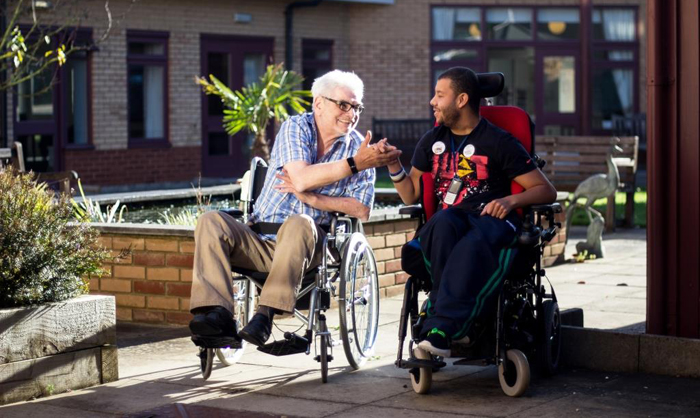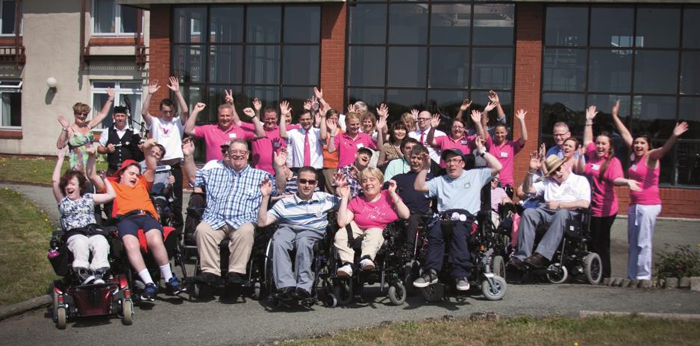As little as half a century ago, the modern concept of respite care was virtually unheard of. Carers of disabled family members were given little support and even less prospect of relief, often at a terrible cost to their own health.
Revitalise – known back in the 60s as the Winged Fellowship Trust – was a pioneer of the modern concept of respite and its irrefutable value in enabling family carers to carry on. From those small beginnings, Revitalise has grown into the UK’s largest provider of quality respite holidays and accumulated over five decades of expertise in the field of respite care.
Revitalise today provides around 5,000 breaks each year across its three accessible centres in Chigwell, Southampton and Southport, with 70% of its guests returning year after year.
Time off
It is now universally acknowledged that regular time off from the daily routine is absolutely essential in maintaining the quality of life of disabled people and carers alike – and Revitalise sees first-hand evidence of this on a daily basis.
Loraine is a Revitalise guest. As her mother and full-time carer Patricia explained: “I’m supposed to be retired but I’m a full-time carer. I’ve always enjoyed working but I do feel rushed off my feet. I get gradually worn down. I can’t do as much as I used to, which is causing great concern and I felt if I didn’t have a break, the situation would only get worse for us both. If Loraine didn’t get away at all, life would be difficult. I would be unhappy and worry; I’d make myself ill.”
Carers UK’s influential ‘Breaking Point’ survey found that three quarters of carers have reached breaking point due to the pressures of their caring role, yet a third of carers have never had a break since they started caring. Most significantly, half of the carers surveyed said that a break from caring would – or did – prevent them from reaching breaking point.
Current debates are turning to the quality of respite as much as its availability. Revitalise wanted to find out if the quality of the residential care available to a loved one had a bearing on the quality of the rest their carers could take. The results were unequivocal. The charity found that worries over the quality of residential care were preventing family carers from taking up respite opportunities. As many of Revitalise’s guests are under the age of 50, a nursing home providing elderly care is a less than desirable environment.
Quality matters
A Revitalise study found that six out of 10 carers felt guilty about needing to use respite care and that worries about the quality of the respite experience were a significant barrier. Put simply, it is not just being able to put a loved one into residential nursing care that enables a carer to ‘switch off’ – but rather it is the quality of this care that seems to make the difference.
The sad fact is that carers’ fears are quite justified. Even in this day and age, respite care often amounts to little more than warehousing for disabled or older people. It is hardly surprising that carers would rather struggle on at home, risking their own health in the process.
Another Revitalise study brought the scale of that risk into sharp relief. The charity found that more than 80% of carers put their loved one’s health before their own and almost 60% said a lack of time away from caring led them to feelings of depression. 60% said long periods without a break resulted in their getting angry at the person they care for.
The study also shone a spotlight on the factors preventing carers from seeking respite. The biggest barrier was shown to be carers’ concerns that nobody else would be able to care for their loved ones (46%), followed by guilt at leaving them (39%) and worry that they would not be looked after properly in a care home (23%).
Beneficial effects
In contrast, when asked about the beneficial effects of respite, nearly half of the carers said it made them feel more able to cope and over a third said they felt happier and healthier.
For Revitalise, the solution is simple – turn a respite break into a holiday. For over 50 years the charity has been finessing its innovative approach to respite care, based on the twin concepts of freedom and choice. In that time Revitalise has found that carers’ worries and guilty feelings can be allayed if the focus is on providing excellent quality of care in a stimulating and socially inclusive environment, with opportunities to experience new things.
Revitalise enhances the lives of disabled people and carers through the provision of breaks that go way beyond traditional concepts of respite care. The charity achieves this by not only providing an inclusive, informal holiday environment, but also a carefully selected range of accessible excursions and in-house activities and entertainment which enable the charity’s guests to regain their vitality and confidence. For carers, the temporary break from caring that Revitalise provides helps them restore their energy and reconnect with their loved ones.
Nobody speaks with more eloquence about the value of good quality respite than those who benefit directly from it. This is what Lucy Burbedge, carer for her mum Sue Whibley, had to say: “By the time Mum went to Revitalise I was quietly losing my mind and desperately needed a break. I was very stressed, depressed and exhausted. I have never been so grateful for time on my own in my life. Mum was safe, happy, and having a really good time. She rested and recuperated and was thoroughly spoiled. What you do helps us all so very much.”
Revitalise is now aiming to double its social impact by opening three new centres around the UK, so that every disabled person and carer in the UK is no more than two hours travel from a Revitalise centre.
For more information about Revitalise breaks, call: 0303 303 0145 or visit www.revitalise.org.uk





